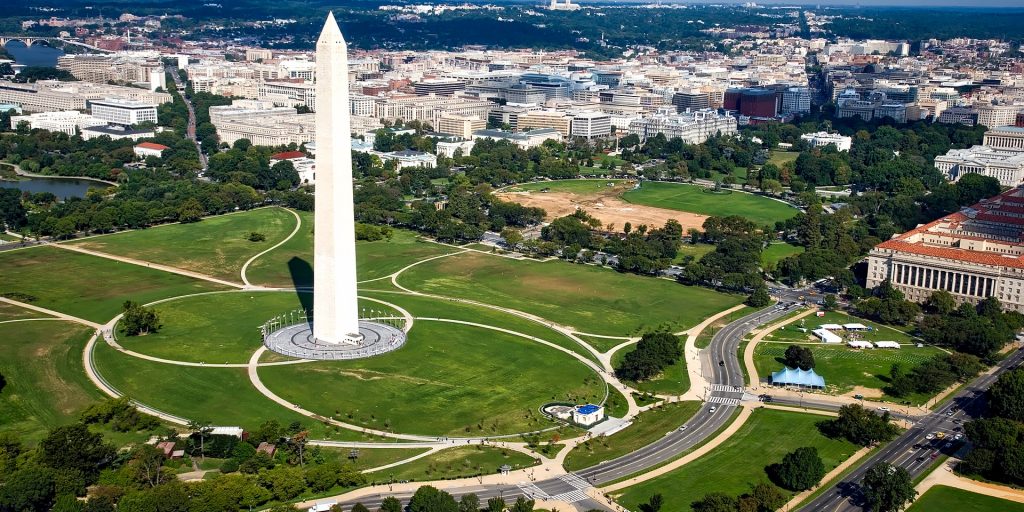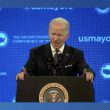NLC conference highlights sweeping federal aid, infrastructure initiatives
After a second pandemic-marked winter, the warming weather feels particularly necessary—a physical representation of rejuvenated markets and an economy that’s gathering steam, fueled by federal spending. Many communities are reemerging with a new vision, bolstered by federal spending packages including the American Rescue Plan Act (ARPA), which was enacted a year ago this month.
This was a common thread in a speech delivered to a roomful of civic leaders Monday by Pres. Joe Biden at the National League of Cities’ (NLC) Congressional City Conference 2022.
“Remember, the lines of cars stretching for miles in your communities, waiting for boxes of food to be put in their trunk?” Biden asked, noting ARPA gave families “just a little bit of breathing room for a bit of time.”
The federal spending plan delivered $65.1 billion in direct and flexible aid to America’s cities, towns and villages, allowing administrators the ability to directly address local needs without cutting through bureaucratic red tape. In conjunction with the Bipartisan Infrastructure Law, ARPA, the measures represent a historic domestic investment. NLC’s leadership lauded the importance of these critical bills, which greatly blunted the pandemic’s fiscal blow and have allowed communities to consider what’s to come after stay-at-home-orders and mask mandates are a part of history.
“Let me say that again—$65.1 billion. This was in response to the devastating economic effects of the COVID-19 pandemic on municipalities across the nation. Our communities were responsible for keeping essential services up and running in the face of economic hardship. Many faced the impossible decision of having to cut critical services or lay off employees,” said Vince Williams, NLC’s president and mayor of Union City, Ga.
In response to their members’ concerns about the pandemic, Williams recalled how NLC brought together local leaders from across the country “to remind Congress that cities are essential—and Congress listened.”
Among various Biden Administration officials in attendance were Julie Chavez Rodriguez, director of the White House Office of Intergovernmental Affairs; Samantha Silverberg, White House Infrastructure Implementation Deputy; Carlton Waterhouse, deputy assistant administrator of the Office of Land and Emergency Management at the Environmental Protection Agency; Andy Berke, special representative for broadband at the National Telecommunications and Information Agency at the U.S. Department of Commerce; and U.S. Secretary of Transportation Pete Buttigieg.
“There is no part of the country that is not going to be touched by this funding,” Buttigieg said, noting his department is currently focused on streamlining the federal loan application process. “Like a common college application, we’re trying to make federal grants more user-friendly—because it is the communities that would benefit most. It’s about creating opportunity—a good transportation project is one that sees that and connects the dots. We’re helping people manage the minutes of where they are and where they need to go.”
Unlike previous spending packages, the recent infrastructure-related initiatives entrust local leaders to responsibly spend their allotments, with limited oversight and expansive freedom. From broadband to bridges and everything in between, administrators can focus federal dollars into the areas where they’ll have the most impact.
“A big part of the reason we were successful was because the rescue plan went directly to you without having to pass go,” Biden said.
Despite the economic resurgence nationally, Biden warned mayors that not everyone will get back to their pre-pandemic baseline. In many households, the pandemic will reverberate for decades to come.
“Underneath the recovery, there’s also been a lot of lasting pain. Lots of folks never get back on their feet when they get knocked down so badly. A whole lot of young people saw their futures dim from the previous recession; it’s what our economists call economic scarring—trapped in long-term unemployment, eviction, or foreclosure,” Biden continued. “When the economy comes back but some folks are left behind. Research shows that, when you’re stuck in that cycle, it has a worse effect on your mental health than the loss of (a loved one).”
Learning from past recessions and how they were handled, Biden said ARPA is intended to “bring everyone along.”
Throughout the week, NLC panelists spoke on everything from leveraging federal dollars for broadband and building a healthy workforce to protecting against cyberthreats and developing affordable housing. Officials also notably condemned Russia’s unprovoked invasion of Ukraine.
“As a mayor and as president of the National League of Cities, I stand with those local leaders who are defending their hometowns against a foreign invasion. I believe it’s times like this that remind us that even though our cities are far apart—they are not that different. The families of Ukraine want similar things to the families in Union City, Ga.—a great education, a safe place for their kids to play, a living wage job. They also want the freedom to express themselves, to vote in free and fair elections, and to live in a free country. It is critical that we maintain a robust and vibrant democracy here at home and reach our arms out to people across the globe who are fighting for their freedom. In other words, we must continue to work to fulfill the promise of America’s cities, towns, and villages,” Williams said.
The conference ended Tuesday with remarks from House Speaker Nancy Pelosi.




















